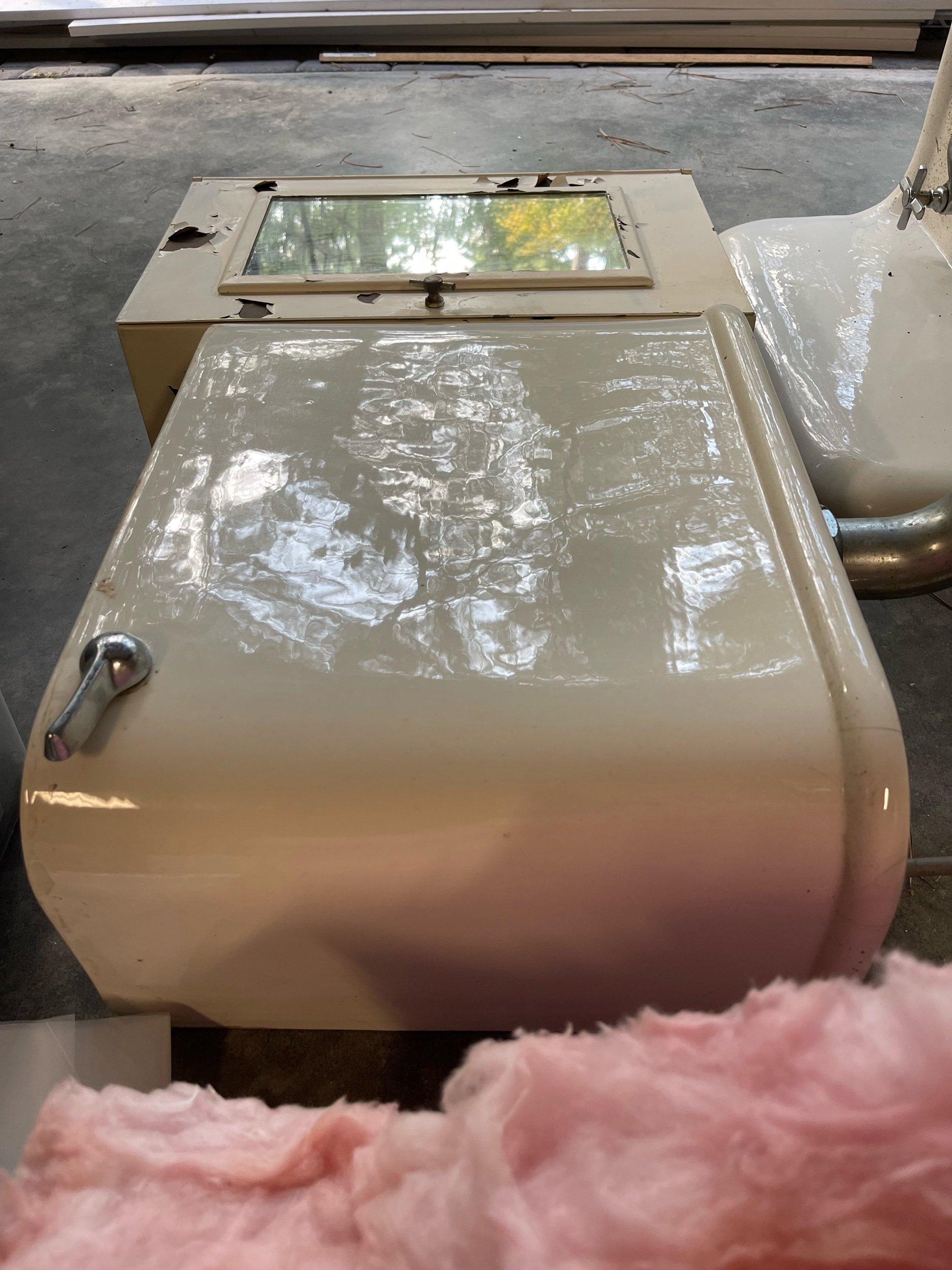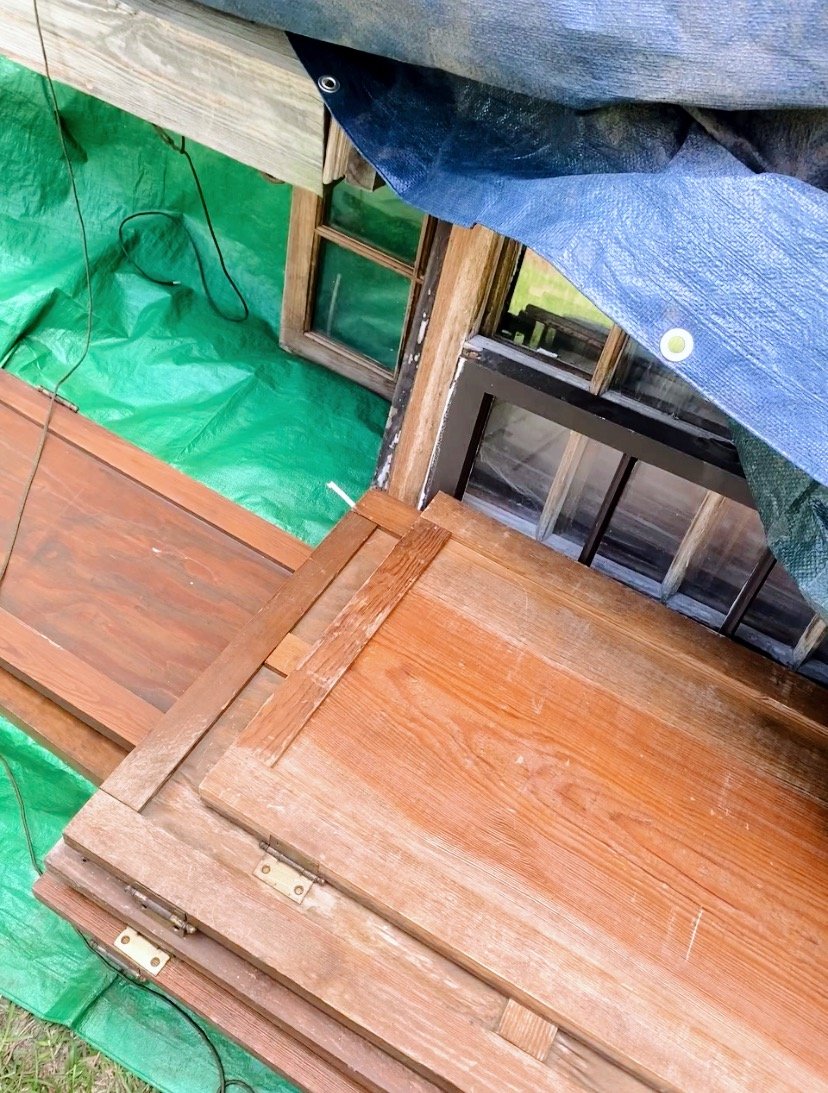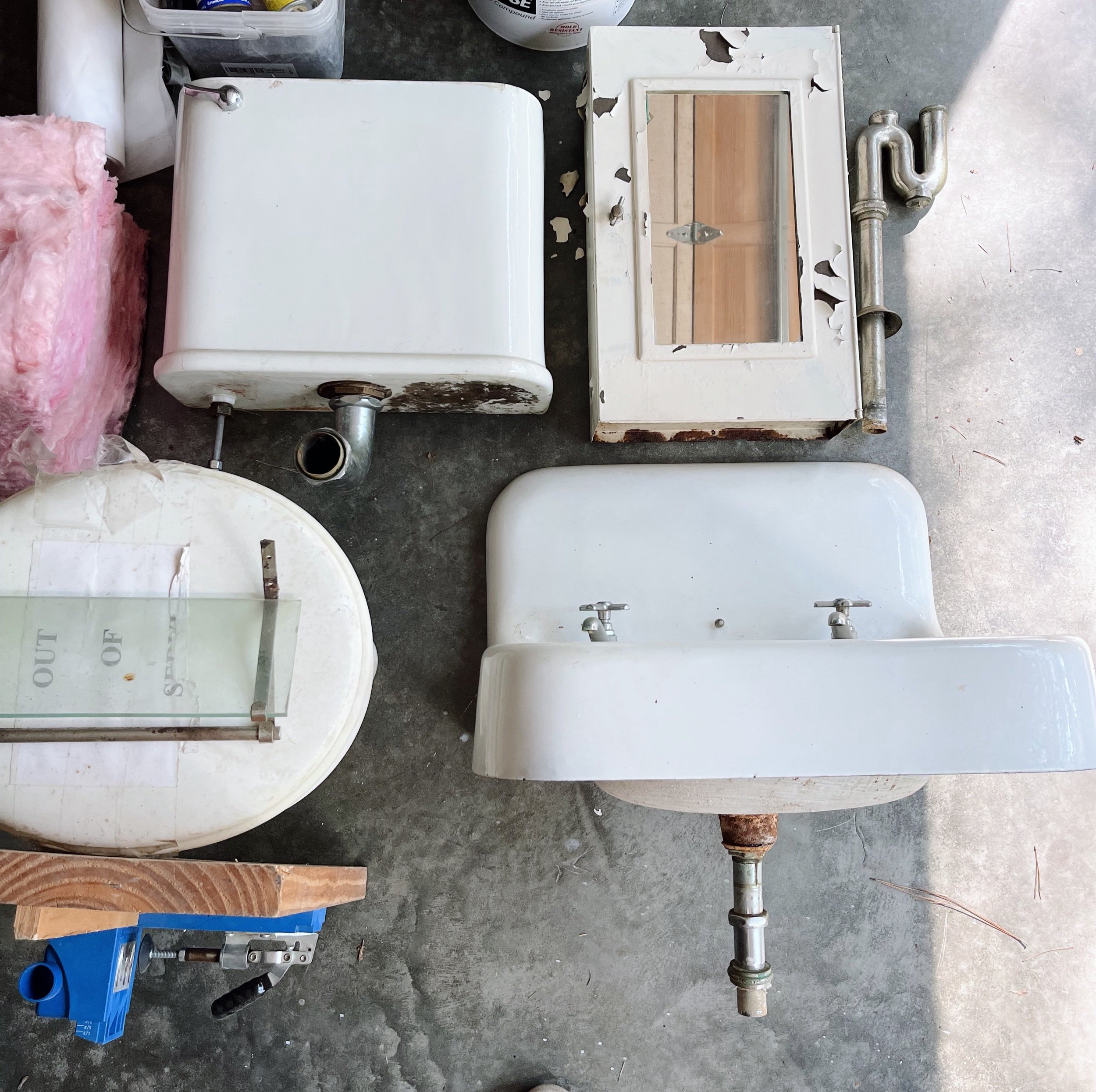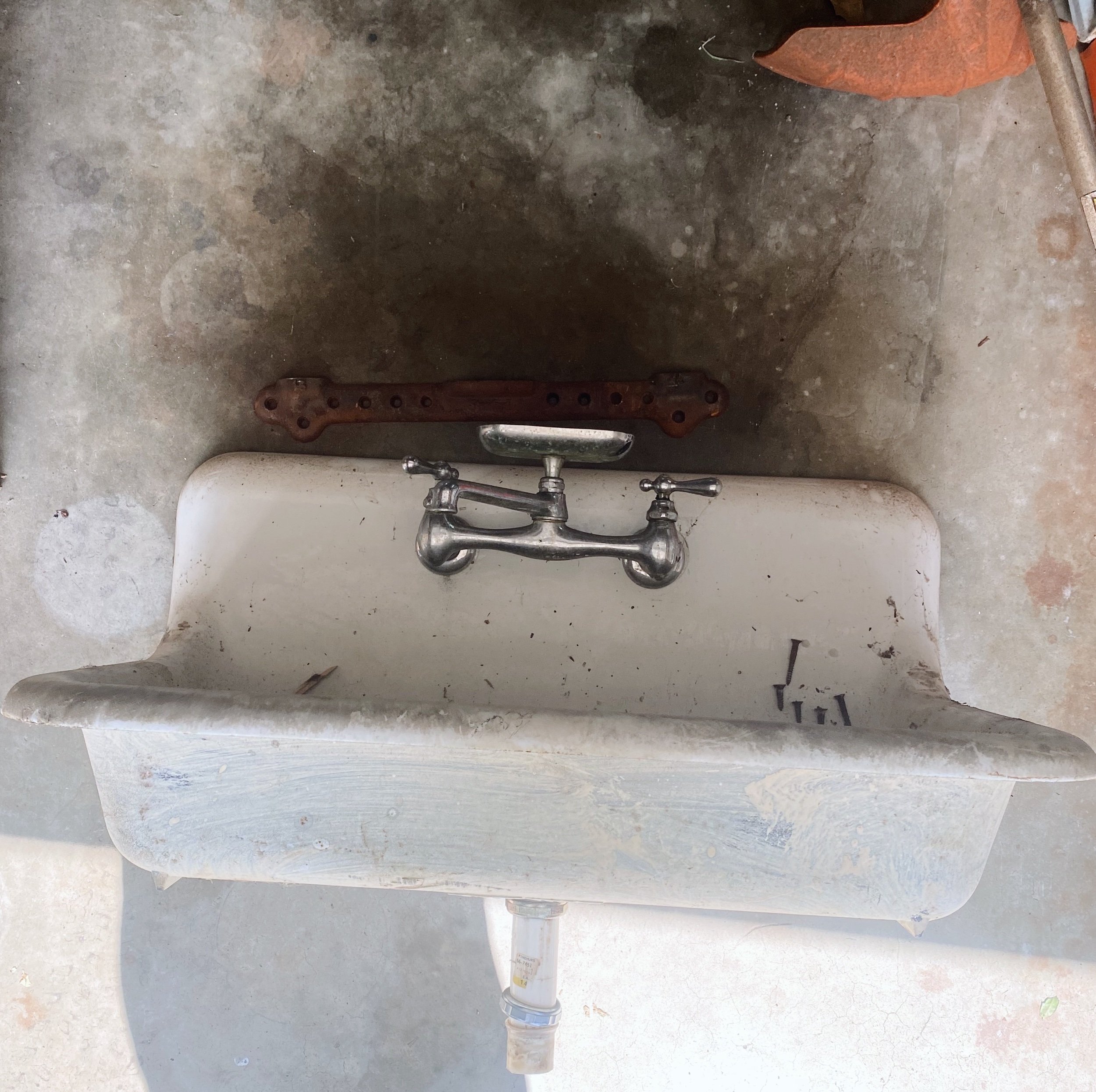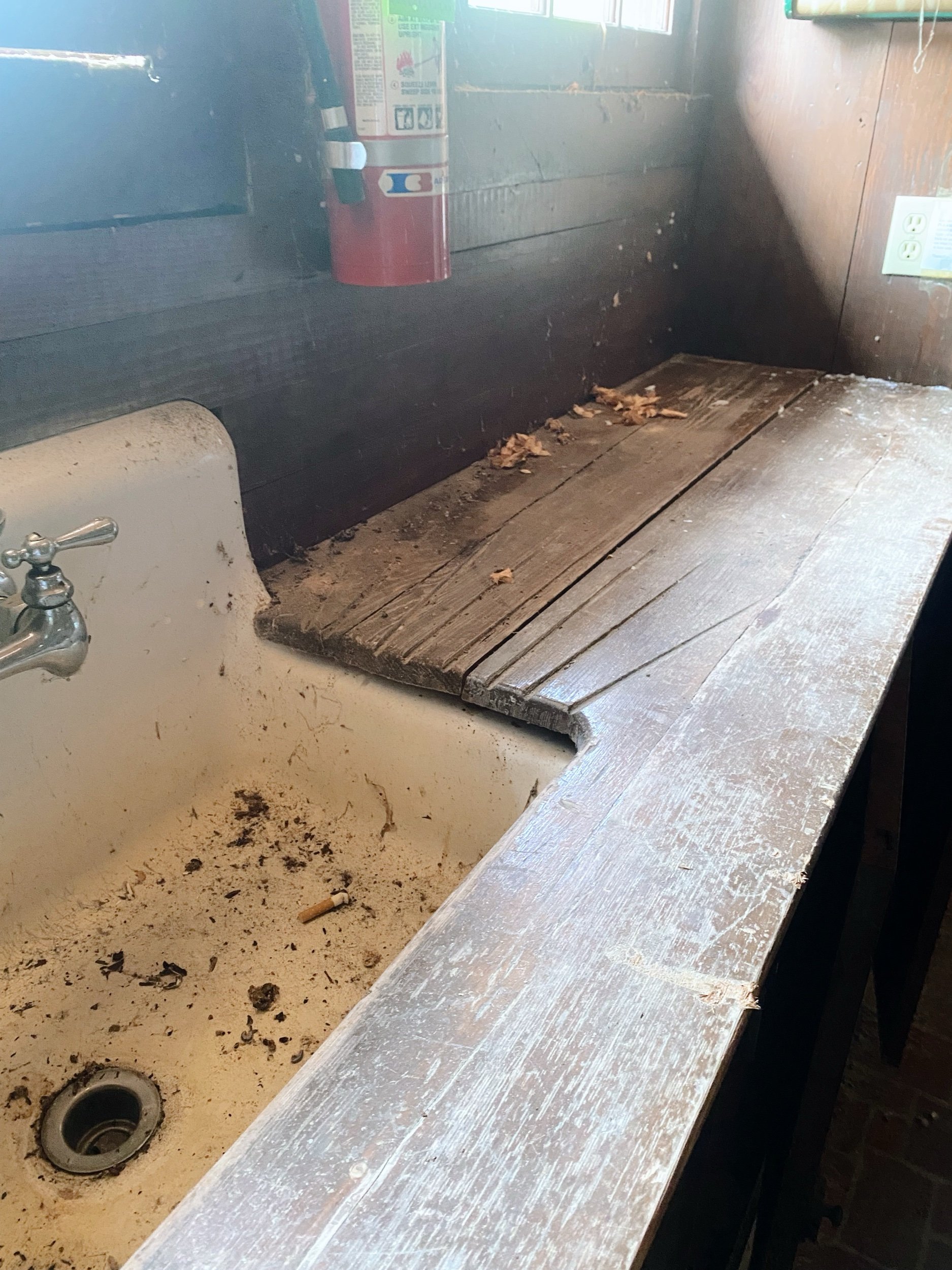Honoring Kennelwood
Kennelwood, date unknown, image courtesy of Tufts Archives, Pinehurst NC
Massive preservation efforts often come along unexpectedly and require both swift action and incredible community organization, cooperation, and resources. And while the outcome in this instance may not be as epic as we had originally hoped — we had visions of this cabin being wheeled through the Pinewild Community and down NC-211 to its new home (could you imagine?) — the story of Kennelwood is one of how it is imperative that we as a community become more proactive in preservation and how you can help.
On July 27, The Pines Preservation Guild’s Executive Director was notified by a concerned Pinewild resident that an "old log structure possibly associated with Annie Oakley" at the club was scheduled to be razed by the end of August. As a non-profit with a mission to save historic structures in Moore County, we sprang into action to find possible alternatives and learn more about this structure.
When we drove by the site, we realized that the original log cabin, obscured by later additions in poorer condition, seemed in excellent shape. We spent the next two days researching the house and were able to confirm via photos from The Tufts Archives that this house may not have been associated with Annie Oakley, rather it is the house that Darthea Crocker Cowgill and her husband, Capt William Cowgill, lived in on her family's sprawling farm and estate west of Pinehurst. The farm was called Pinewild and the little two-room log cabin was called Kennelwood. Darthea and her mother, Faye Crocker, were two of the founders of the Sandhills Women's Exchange — the 100 year old non-profit still serving the Sandhills from their log cabin in Pinehurst. When the Pinewild farm was sold to create the Pinewild Country Club, the main house and the barns were demolished, but Kennelwood was retained and used by the Country Club as a real estate office. It was the sole remainder of the Crocker estate and remained unused for roughly a decade.
The 2017 Far Away Farms and Hunt Lands National Register Nomination stating the importance of the cabin.
A Race Against Time
As soon as we discovered the significance of the building, we immediately contacted The Sandhills Women's Exchange, Moore County Historical Society, and The Village Heritage Foundation and started working on a new plan for this building. On-site visits with our preservation consultants and a certified house mover confirmed that the original log structure was in good condition and that it could be moved. We also notified the Village of Pinehurst Council to see if they could assist in any way. The cabin owners and club management graciously allowed us numerous visits to the building and even extended the demolition timeline by a few weeks as we continued to work on solid alternatives to a total demolition. However, the timeline — approximately 30 days from when we were originally notified — significantly hindered moving and possible fundraising options. We also found two local citizens who were willing to provide a new home for the building and confirmed with the house mover the approx $50,000 cost to move the structure. But then we hit roadblocks: while the building would have been a prime candidate for a state historic preservation grant, those usually require a 4-6 month application and review timeframe - not time we had on our side. None of the nonprofit organizations we were working with, including ours, had money that could be spared for this emergency effort. A massive fundraising effort could have been initiated, but raising $50,000 in one week is not reasonable yet was needed in time to secure the house mover and permits prior to the planned demo date. Factor in needing permission from Pinewild to remove bushes, trim trees, and get through the Pinewild gate houses and you have a condensed the timeline that was practically impossible to meet.
No matter how hard our four organizations tried to make things work to move the whole building, the timeline, resources, and logistics simply did not work in our favor. The salvage of Kennelwood's pristine logs and irreplaceable interior fixtures became our next option.
Kennelwood July 2023, Photo Courtesy of Cara Mathis
Salvaging For the Future
The next possibility we began investigating was salvage to keep as much historic material out of the landfill as possible. Moore County Historical Association was able to identify logs that will help them repair the historic log structures in their care as well as other historic log cabins in the area. While a number of windows and original cabinetry were already removed prior to our involvement, The PPG was able to coordinate salvage of the stunning 1935 enameled cast iron American Standard kitchen sink, a 1917 porcelain toilet and cast iron sink, and the solid walnut kitchen cabinet doors by member contractor Jim Crawford. These items have already found new homes in existing rehabilitation projects. We also salvaged a large number of newer wood windows for use in our future window restoration workshops.
The removal of approximately 20 large logs from the cabin occurred during demolition and will make their way to MCHA’s Bryant House to help repair deteriorated logs at that structure and other historic log structures in the area.
A huge credit goes to the team that worked tirelessly to save and then salvage Kennelwood: Ned Franke from The Village Heritage Foundation, Judie Wiggins from Sandhills Women’s Exchange, Matt Farina and Ariel Matthews from Moore County Historical Association, and Pinehurst residents Cara Mathis, Cindy Edgar, Kim Geddes, and Laura Byers.
The salvaged 1915 logs. Image courtesy of Stephen Farr
Proactive Preservation and a Call to Action
If this process has shown anything, it is how passionate and committed Moore County’s historic preservation and history nonprofit organizations are. It also shows the importance of our community members in alerting The Pines Preservation Guild as soon as they hear of a potential historic structure that may be in peril so we can work on alternatives as quickly as possible as time is always of the essence with preservation. Time and money.
As a preservation organization with the mission of saving threatened heritage buildings in Moore County, we can no longer be in a situation where we have no funds to contribute to an emergency. We also cannot continue to be reactive, needing to launch massive fundraising efforts only after a demolition threat becomes evident.
If we're going to save the heritage buildings of Moore County, we need to be proactive and we need to raise funds now so we have them in a reserve fund to use in these instances.
The Board of The Pines Preservation Guild has decided to create "The Pines Preservation Guild Emergency Fund" for instances like Kennelwood. As unprecedented development pressures continue, we feel that this fund dedicated strictly to emergency situations with a timeline of 60 days or less will be our best way to prove that we are providing real solutions when a historic building in Moore County is threatened.
We need your help to make this happen
The money raised in this fund will be used to help our organization as follows:
Provide emergency funds (60 days or less) to help cover, partially or in full, the cost of moving a threatened historic structure to a new safe location, with an easement on the property to ensure its perpetual protection
Provide funds to cover, partially or in full, assisting with emergency stabilization and/ or repair efforts of threatened historic properties, especially when required by a local municipality, in 60 days or less
Cover, partially or in full, the cost needed to salvage and store substantial portions of a threatened property when moving the structure is not an option.
Assist area nonprofits with emergency stabilization and/ or repair efforts of threatened historic properties, especially when required by a local municipality, in 60 days or less
Funds will not be used to assist a private individual or business with the purchase of a threatened property.
All donations are tax-deductible and can help us ensure that no other historic structure in Moore County is lost or neglected beyond repair solely due to lack of funds.
You can donate below to the Emergency Fund to help us in our mission of saving heritage buildings and communities in Moore County as well as helping to honor Kennelwood and the other historic structures recently lost to demolition in Moore County.
CPT William Cowgill, Darthea Crocker Cowgill, and C.T. Crocker infront of Kennelwood, date unknown







